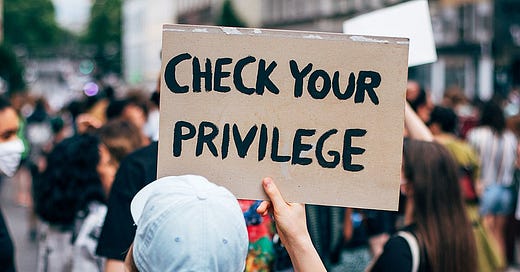Dealing with The Urgency of The Privileged
The Challenge of De-centering My Emotions in Social Activism Work
Image by Ivan Radic
Content warning: inhumane condition of homelessness
I recently learned about White urgency from Courtney Ahn, a Korean American activist designer. It is the sense of urgency that White people feel when they first learn about racism and feel urged to end it immediately. As a result, they act on performative gestures and center how they feel about the issue, instead of the issue itself. Such an attempt to end racism inevitably meets a quick end because it is an impossible task to begin with. White urgency fails to see that racism is a systemic problem and demands a long-term commitment to advocacy work.
I experienced something parallel to White urgency last month: perhaps, the urgency of the privileged. During my morning walk, I found out that Jojo, a homeless man in my neighborhood, got kicked out of his corner in the abandoned plaza. He couldn’t stay there any longer because the plaza had been sold and was getting ready for reopening. He had no place to go and accepted my offer of getting information on shelters.
As I was walking away, I discovered something that sent me into a shock. Jojo was sitting on the curb of the storefront. His jean jacket came down to his hip and had covered my view from up above. That’s why I hadn’t realized earlier that his pants were down halfway and there was a pile of poop underneath him.
My face heated and my heart raced. I rotated through a bout of emotions: shame, guilt, anger, and despair. I searched for information on the internet and called places. Once I got the information, I was eager to get back to JoJo to make progress on this situation. I was determined to send him to a shelter that day. I believed that it will be good for him and me. He will feel safe and relieved in the new place. I will feel free of worry and all the other emotions with him being out of my sight.
I asked my partner Chris to accompany me. “When?” “Right now.” He explained to me that he is in the middle of his work and can accompany me later. He wondered why I can’t wait for him. I told him that I am too emotionally unstable to do anything else until JoJo’s situation is resolved. Chris said, “He is not going anywhere. You can still help him get to a shelter later today.”
That’s when I realized that I am experiencing something similar to White urgency. My determination to fix JoJo’s problem was motivated by my desire to settle my difficult emotions more than anything. I was centering myself instead of him.
I have a gift of empathizing with people who have different needs from my own and caring about their well-being. For a long time, I struggled with empathy fatigue and practiced prioritizing self-care. Now I’m learning that turning my desire to help to action is not as simple as it seems. Giving help however I want is not helpful. I need to think in the shoes of its recipient and try to offer help the way they want it: centering them instead of myself.
Do you have any similar experiences? I’d love to hear. Leave me a comment by clicking the blue button below.
Love,
Linda
P.S. I recognize that I am privileged in some ways and marginalized in other ways. I can reflect on my experience and adjust my behavior depending on the situation and context.




